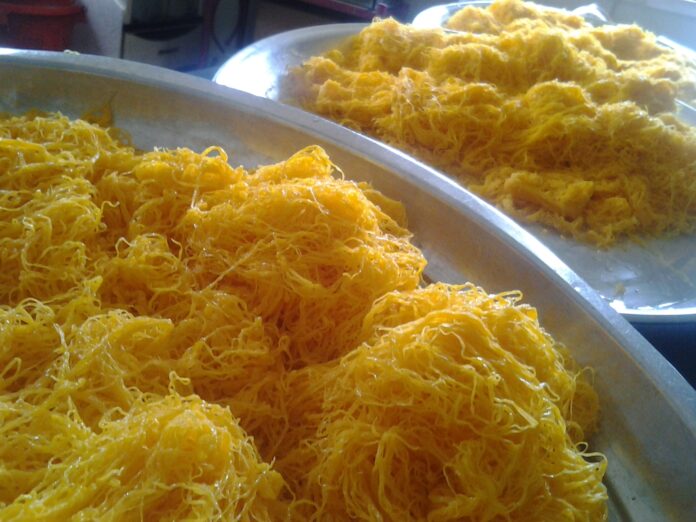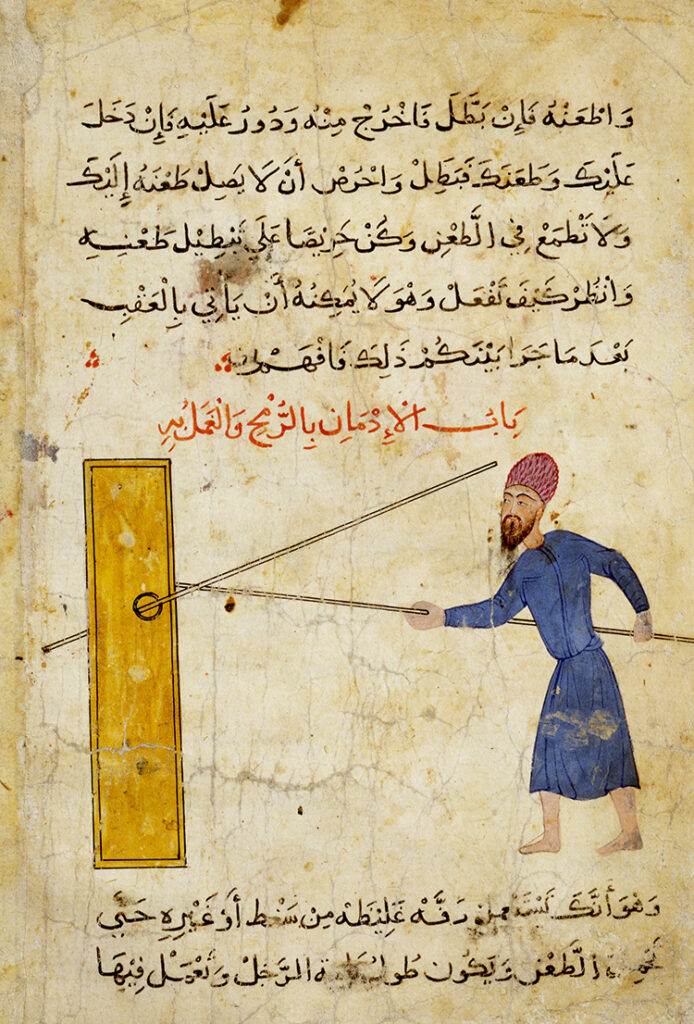“Everyone, wake up. Rise and shine.” Hajah Ramlah starts to wake her children up. Zul stretches and rubs his eyes. “Mom, you woke us up too early… there’s still a lot of time before Subuh,” Zul commented, glancing at the Junghans clock beside him.
“Obviously… you all have to wake up early. We need to eat our sahoor.” Hajah Ramlah said, exiting her children’s bedroom after switching on the lights.
“Oh, yeah, we begin our fasting today,” Zul whispered to himself.
Our Prophet PBUH advised:
تَسَحَّرُوا فَإِنَّ فِي السُّحُورِ بَرَكَةً
“Take a meal a little before dawn, for there is a blessing in taking a meal at that time.” [1]
Fauziah and Noriah have been up preparing food with Hajah Ramlah in the kitchen. Although they are just children themselves, both are conscientious in helping their mother to cook for sahoor. That is the norm for village girls. They are well-trained with kitchen work at a young age.
“Mi, that fish singgang mom made looks so delicious. Hehe…” Zul’s eyes were wide open looking at all the appetizing meals served on the table. His older brother just nods his head and continued eating. “Better stop twaddling. It’s nearly time for the adhan, hurry or you won’t have enough time to eat.” Mi cautioned his brother, Zul who has yet to eat sahoor. Looking pensively at the food as he sat at the dining table.
The Prophet ﷺ said:
إِنَّ بِلاَلاً يُنَادِي بِلَيْلٍ، فَكُلُوا وَاشْرَبُوا حَتَّى يُنَادِيَ ابْنُ أُمِّ مَكْتُومٍ
“Bilal calls for prayer when it is still night, so eat and drink till Ibn Umm Maktum calls for prayer.” [2]
Imam al-Nawawi rahimahullah in al-Majmūʿ stated:
“We have stated that when the sun has risen and at the time, there is (in his mouth) food, then he has to take it out and then complete his fast. If he swallowed what is in his mouth, when he is certain that the sun has risen, then his fast is invalidated. The evidence is the hadith from Ibn ‘Umar and ʿĀ’ishah radhiallāhu ʿanhā where Rasulullah ﷺ said: إِنَّ بِلاَلاً يُنَادِي بِلَيْلٍ، فَكُلُوا وَاشْرَبُوا حَتَّى يُنَادِيَ ابْنُ أُمِّ مَكْتُومٍ (the above stated hadith)…” [3]
Ustaz Mad would always remind his children to finish eating their sahoor around imsak time or approximately 10 minutes before the adhan as a cautionary step (īḥtiyāt). Imsak begins at the last one-third of the night or at the rise of fajar kadhib which signals that the Subuh time is near.
Usually in Malaysia and several other countries, the time for imsak is set to be 10 minutes before Subuh. This is set as a cautionary step for if the Subuh time has begun, then any food or drink that enters one’s cavity would invalidate his fast.
Zul hastily feed food into his mouth, fearing that he wouldn’t have enough time to eat his sahoor. If that is so, then he would have to starve all day. Alang who was sitting right beside him was just pushing his food around on his plate, grinning to himself, with his eyes closed. “Alang, you look horrible! Quickly eat your food!” Zul exclaimed, shaking his brother trying to wake him up.
The village children’s activity is pretty much the same even in Ramadhan. There are those who would fast and others just fast for half a day and by noon, they would search and ask for food. After Asar, Zul and his friends would play with their bamboo toy guns. If there was a “war” or toy gunfight in Kampung Kubang Kekura, he would be the commander.
“Did you lie? Haha… Teacher Man asked whether you are fasting or not and you answered you’re fasting.” Zul asked his friend, as Arif sat down, tired after playing with his toy gun. “Hahaha…I have to be smart in order to live. But I regret it. It’s sinful.” Arif contemplates beside his Chopper.
The time to break the fast is the most anticipated time for all. Before breaking fast, Hajah Ramlah would ask her children to give some food for breaking fast to their neighbours. That is the custom and tradition in villages. Neighbours would exchange their food and meals. Nekbat, Akok, Qasidah, Jala Mas are among the favourite desserts. The taste of these delicacies? They are so sweet!

Jala Mas is a sweet dessert
These desserts can be found on any other day on the East Coast but they are sought after during Ramadhan. What’s more, Zul and his siblings were overjoyed when they would even receive 10 or 20 cents as well as other dishes in exchange every time they went to their neighbours’ houses to give away meals. During the 70s it was quite an amount for kids to receive.
“Dummm…Dummm…” the sound of the cannon being fired situated on top of Bukit Pak Apil could be heard signalling the time for breaking fast. The canon is also fired once when it is imsak. The history of the beginning of the tradition to fire the cannon to signal the time for breaking fast is said to have started during the Mamluk Dynasty era in Cairo between the 15th and 19th centuries. At first, the government intends to test the newly bought cannon and incidentally it was the time for Maghrib prayers. The residents in Cairo thought the firing of the cannon is to signal it is time to break the fast.

Manuscript sketch of spear training during the Mamluk Dynasty
Pasha who was the ruler at the time witnessed the awe of his people because of it and immediately declared it as new innovation and policy to signal the time to break the fast. Maybe this is where the firing of cannon at Bukit Besar originated from.
Every night, Ustaz Mad and his sons would perform the Tarawih prayer at the surau. “Dad, can we perform only eight rakaat tonight?” Mi asked while looking at the floor, scared to look at his father. The question was certainly from all his brothers who were hiding behind their eldest brother.
“Twenty, afterwards perform the witir, then we will go home.” Ustaz Mad answered, brief and firm. Rarely would Ustaz Mad ever perform the tarawih prayer at home with his family. Occasionally, Hajah Ramlah and his daughters would also join him to perform Tarawih at the surau if he did not pray at home.
Tarawih prayer is encouraged for all Muslims. The rewards offered are great as narrated from Abu Hurairah radhiallahu ‘anhu where he said, the Prophet PBUH said:
مَنْ قَامَ رَمَضَانَ إِيمَانًا وَاحْتِسَابًا غُفِرَ لَهُ مَا تَقَدَّمَ مِنْ ذَنْبِهِ
“He who prays during the night in Ramadan with faith and seeking his reward from God will have his past sins forgiven,” [4]
The above hadith clearly explains that the act of qiyam in Ramadhan includes praying Tarawih, reciting al-Quran, dhikr, supplication and other worships performed during the night in Ramadhan, if performed with the faith of its sanctioning and seeking the rewards from Allah SWT, then his past minor sins will be forgiven.
Imam al-Nawawī in his book Al-Nawawī ʿalā Muslim stated: “Qiyam in Ramadhan means Tarawih prayer.” [5]
The sanctioning of tarawih prayer is mentioned in a hadith from Umm Umm Al-Mu’minīn ʿĀ’ishah radhiallāhu ʿanhā where she said:
أَنَّ رَسُولَ اللَّهِ صلى الله عليه وسلم صَلَّى ذَاتَ لَيْلَةٍ فِي الْمَسْجِدِ فَصَلَّى بِصَلاَتِهِ نَاسٌ، ثُمَّ صَلَّى مِنَ الْقَابِلَةِ فَكَثُرَ النَّاسُ، ثُمَّ اجْتَمَعُوا مِنَ اللَّيْلَةِ الثَّالِثَةِ أَوِ الرَّابِعَةِ، فَلَمْ يَخْرُجْ إِلَيْهِمْ رَسُولُ اللَّهِ صلى الله عليه وسلم، فَلَمَّا أَصْبَحَ قَالَ قَدْ رَأَيْتُ الَّذِي صَنَعْتُمْ وَلَمْ يَمْنَعْنِي مِنَ الْخُرُوجِ إِلَيْكُمْ إِلاَّ أَنِّي خَشِيتُ أَنْ تُفْرَضَ عَلَيْكُمْ وَذَلِكَ فِي رَمَضَانَ
“The Messenger of Allah, may Allah bless him and grant him peace, prayed in the mosque one night and people prayed behind him. Then he prayed the next night and there were more people. Then they gathered on the third or fourth night and the Messenger of Allah, may Allah bless him and grant him peace, did not come out to them. In the morning, he said, “I saw what you were doing and the only thing that prevented me from coming out to you was that I feared that it would become obligatory (fard) for you.” [6]
According to the above hadith, on the first night of Ramadhan, Rasullullah PBUH went to the mosque at night and prayed. Then others in the vicinity saw him and followed him, praying together with him at night. The same goes on the second night, just that the number of people joining him increases. On subsequent nights, the number of congregants continues to rise until the mosque is filled.
On the following night, Rasullullah PBUH did not come to the mosque and a huge group of congregants were waiting for him. Afterwards, the Prophet PBUH came and perform the Subuh prayer, turned towards the congregants and said as stated in the hadith.
Shaykh Shams al-Ḥaqq al-ʿAẓīm al-Ābādi when commenting on the above hadith said: “He was worried that tarawih prayer will be made obligatory on them. The reason is it may be made obligatory of the act qiyam in Ramadhan to be performed in congregation if it was performed continuously.” [7]
Thus, it is apparent from the above hadith of ʿĀ’ishah radhiallāhu ʿanhā that it is permissible to perform the tarawih prayer at home. Furthermore, performing tarawih in congregation is prioritized compared to performing it alone.
Imam Al-Nawawī said:
وَتَجُوزُ مُنْفَرِدًا وَجَمَاعَةً وَأَيُّهُمَا أَفْضَلُ فِيهِ وَجْهَانِ مَشْهُورَانِ كَمَا ذَكَرَ الْمُصَنِّفُ وَحَكَاهُمَا جَمَاعَةٌ قَوْلَيْنِ (الصَّحِيحُ) بِاتِّفَاقِ الْأَصْحَابِ أَنَّ الْجَمَاعَةَ أَفْضَلُ
“And it is permissible (performing tarawih prayer) alone or in congregation. Regarding which is prioritized among the two, there is a famous opinion as stated by musannif and narrated by the majority (al-Shāfiʿiyyah), sahih through the agreement of the ashab, that performing it in congregation is prioritized.” [8]
_________________________________
[1] Sahih al-Bukhari (1923) and Sahih Muslim (1095)
[2] Sahih al-Bukhari (620)
[3] See Al-Majmu’ Syarh al-Muhazzab (6/333)
[4] Sahih Al-Bukhari (37)
[5] See Sharḥ Nawawī ʿalā Muslim, (6/377)
[6] Sahih Al-Bukhari (1129)
[7] See ʿAwn al-Maʿbūd Sharḥ Sunan Abī Dawūd (4/180).
[8] See Al-Majmu’ Syarh Al-Muhazzab, Al-Nawawi (4/31)
